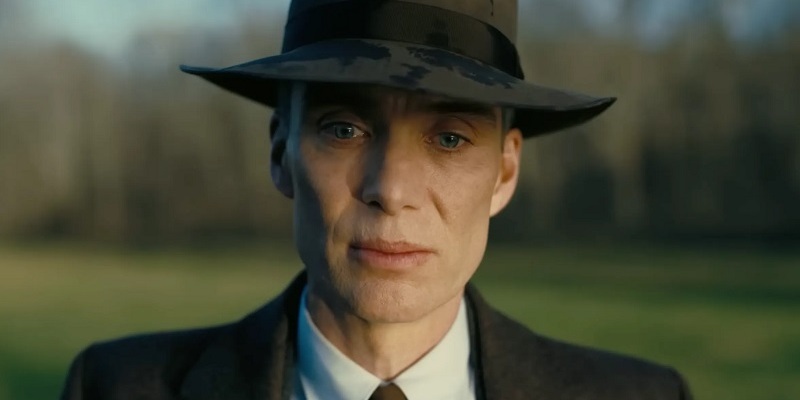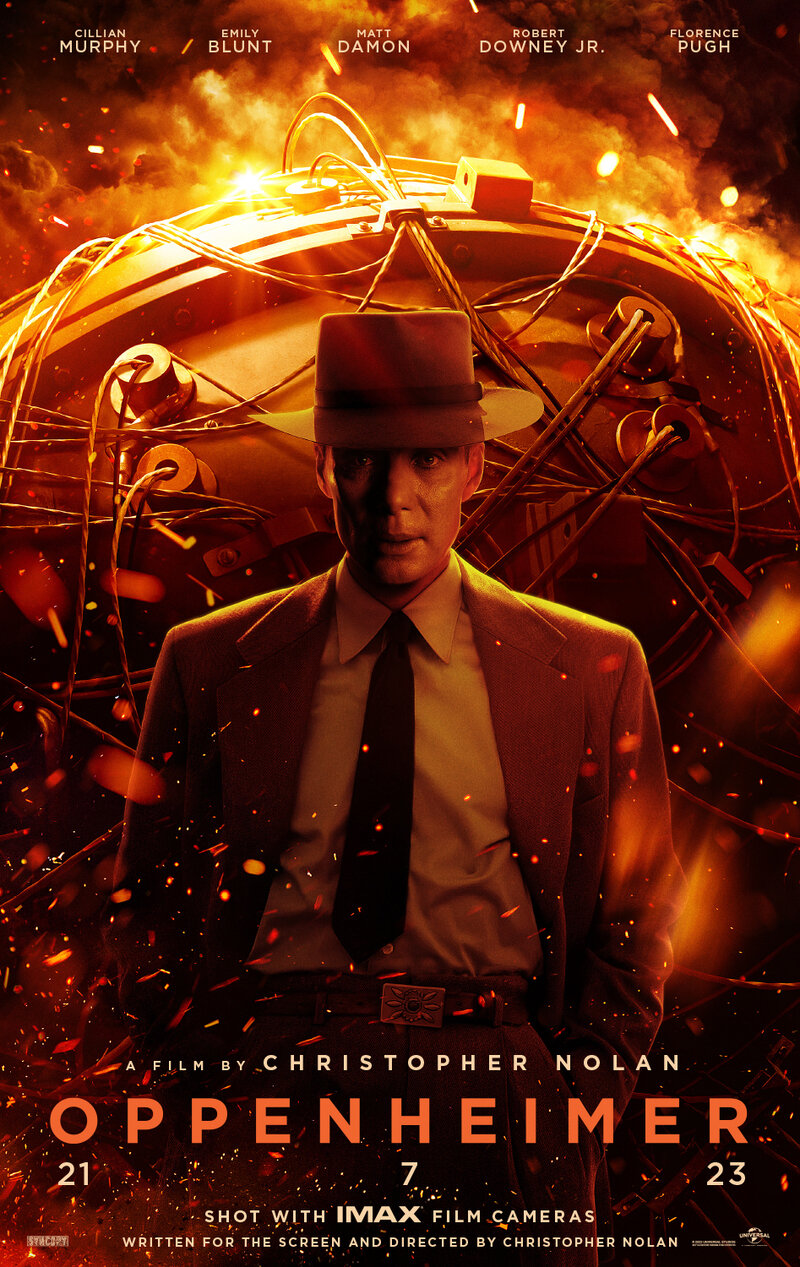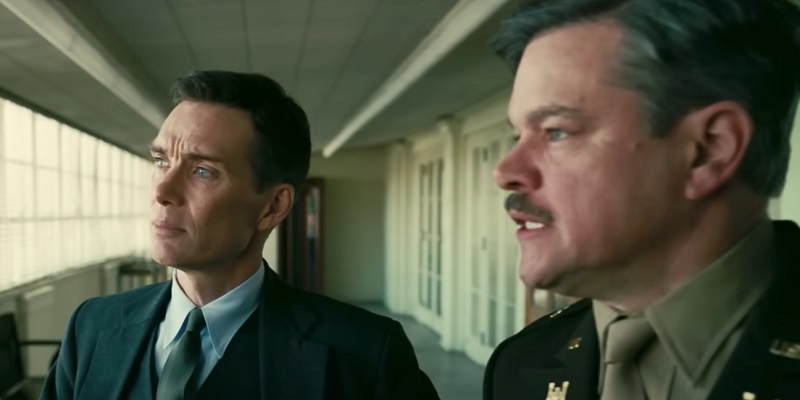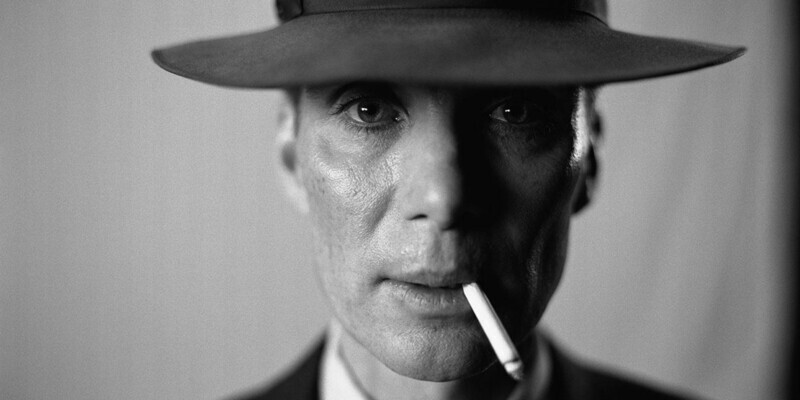
Review by
Eric Hillis
Directed by: Christopher Nolan
Starring: Cillian Murphy, Emily Blunt, Matt Damon, Robert Downey Jr, Gary Oldman, Casey Affleck,
Florence Pugh, Benny Safdie, Michael Angarano, Josh Hartnett

Hollywood loves the biopic, probably because it's a genre that combines
name recognition with potential awards glory. But very few biopics are
worthwhile, and most leave you wishing you had just watched a 50-minute
PBS or BBC documentary rather than a bloated feature film. The few
worthwhile biopics tend to hone in on a specific period of their
subject's life. Christopher Nolan's
Oppenheimer hones in on two periods of physicist J. Robert
Oppenheimer's life, and it often feels like two different movies edited
together. One is a riveting wartime thriller, the other a rather flat
post-war courtroom drama. If we can split the atom, maybe some intrepid
amateur editor will at some point in the future split Nolan's movie in
two and extract a very good 90 minute movie from its current three
hours.
Taking its cues from one of the few great biopics – Milos Forman's
Amadeus – Oppenheimer gives us its own
version of Mozart vs Salieri. The Mozart figure is of course
Oppenheimer, played by Cillian Murphy in his biggest role to
date. Pitted against him is Robert Downey Jr's Salie…, sorry,
Lewis Strauss. In the film's less engaging timeline it's 1954 and
Strauss is head of the US Atomic Energy Commission (AEC). Oppenheimer
finds himself the subject of a kangaroo court determined to expose him
as a communist and strip him of his security clearance. We're told
Strauss has it in for Oppenheimer, but we're never really shown why this
might be. This is a recurring problem throughout Nolan's film. In its
race to pack in as much information as possible in its three hours we're
told a lot of things about a lot of people, but shown very little to
back up such statements.

The far more exciting portion of Oppenheimer is devoted
to the race to develop the atom bomb before the Nazis. I have a lot of
issues with Nolan's filmmaking but this sort of ticking clock narrative
is something he does better than most. It's made clear that when
Oppenheimer and his fellow boffins embarked down this path they had no
idea what the results might be. There's a chance that setting off an
atom bomb might cause a chain reaction that would essentially destroy
the world. It's a near zero chance mind, but as one character remarks,
"Zero would be nice."
What's impressive about how Nolan constructs this sequence is that by
the simple fact that we're sitting in a cinema watching
Oppenheimer, we know the world wasn't destroyed when that key button was pushed,
yet it's incredibly tense regardless. Nolan puts us in the shoes of the
men about to make that potentially fatal call, and our own hindsight
goes out the window. Those scientists knew there was a chance, however
small, that it could all go horribly wrong, and their apprehension is
palpable.
Nolan's two main weapons in selling this idea are Murphy's eyes, two of
the most expressive in modern cinema. Brash at first in his younger
days, Oppenheimer becomes more insular and taciturn as the film
progresses and the fate of the world weighs down on his scrawny
shoulders. But Murphy's eyes tell us just what he's going through. As
the film progresses and Oppenheimer becomes more distraught and
guilt-ridden, Murphy's eyes take on the appearance of a pair of ghostly
children peering out the windows of a crumbling Edwardian home. When
Oppenheimer receives some bad personal news and breaks down, you get the
feeling it's a relief of sorts, a distraction from his role in the
potential destruction of the world.
Supporting characters are far less enriched however. It's easy to mock
Nolan's ongoing struggle to write a compelling woman but the two female
figures here – Oppenheimer's wife Kitty (Emily Blunt) and Jean
Tatlock (Florence Pugh), a young communist he has an affair with
– are as bad as any he's written. Kitty is particularly puzzling,
portrayed as a weird mix of sozzled-era Liz Taylor and Lady Macbeth, and
Blunt appears to be begging for some sort of clear direction throughout.
Tatlock seems to exist merely to get some steaminess into the drama. In
one of the unfortunate cues Nolan takes from '90s Oliver Stone here,
Kitty imagines a naked Tatlock straddling her husband as he's being
grilled by McCarthyites. It's the cringiest thing I've seen in some
time.

Nolan likes to dial things up, and the cringe factor is no exception
here. The by now groan-worthy biopic trope of making casual reference to
something that will become relevant at a later stage is employed several
times here: "My favourite spot to get away…Los Alamos," "And that man
was…John F. Kennedy" etc. At one point Oppenheimer is asked to translate
a sanskrit copy of the Bhagavad-Gita, and it just happens to randomly
open on the page bearing the "destroyer of worlds" passage.
The cringe extends to some of the supporting performances. To balance
some great turns – Matt Damon's Leslie Groves,
Josh Hartnett's Ernest Lawrence, Downey Jr's Strauss – we get
Gary Oldman hamming it up as Harry Truman and
Kenneth Branagh and Benny Safdie butchering European
accents. In this age where Hollywood purports to be so concerned with
representation, why are we still getting Anglophone actors delivering
Dr. Strangelove caricatures of continental Europeans?
Much of the marketing around Oppenheimer has focussed on
its use of the 65mm IMAX format and Nolan recreating the Trinity test
explosion without the use of digital effects. Considering the bulk of
the movie consists of close-ups of blokes talking, it's hard to argue
that this is a movie that needs to be seen on the biggest screen
possible (I can't believe this is bumping
the latest Mission: Impossible
from IMAX screens). "I bet that explosion is something else though,
right?" you might ask. Well, it's pretty underwhelming. It can't hold a
candle to the nuclear blast from the incredible eighth episode of
Twin Peaks: The Return, and I've seen better explosions on TJ Hooker.

A common complaint directed at recent Nolan films has been the
inability to clearly hear dialogue, given his penchant for drowning it
out with screeching scores. That's thankfully not an issue here. Given
how heavily Nolan relies on dialogue to tell this story, I don't think
even he would have risked pissing off audiences once again in this
manner. But the score, by Ludwig Göransson, is nevertheless
intrusive, especially in the 1954 portion. Though this segment is
essentially an intimate courtroom drama, the composer scores it as
though he's still watching the Los Alamos portion. The effect is like
watching an episode of Matlock while blaring Stravinsky's
The Rite of Spring through your speakers.
Perhaps Oppenheimer's biggest flaw is how little insight it gives us into the man himself.
All I knew about Oppenheimer beforehand was that he was the key figure
in developing the atom bomb and that he felt pretty bad about this for
the rest of his life. Having watched the movie I still don't really know
anything more about the man.


